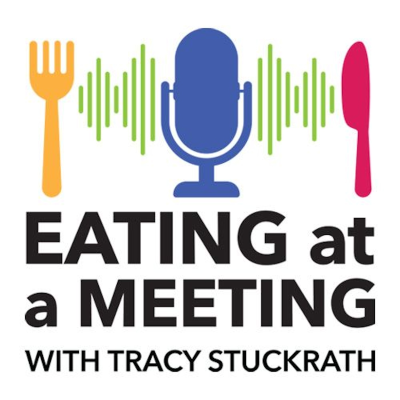
Eating at a Meeting
Englisch
Kostenlos bei Podimo
Kostenlos hören bei Podimo
Starte jetzt und verbinde dich mit deinen Lieblingspodcaster*innen
- Vertraut von über 1 Mio. deutschen Hörer*innen
- Über 1.000 lokale Podcasts und Shows – nur bei Podimo
- Keine Zahlung nötig
Mehr Eating at a Meeting
Eating at a Meeting explores a variety of topics on food and beverage (F&B) and how they impact individual experience and inclusion, sustainability, culture, community, health and wellness, laws and more. The mission of Eating at a Meeting is to share authentic stories that illustrate the financial, social, emotional, and mental impact food and beverage have on individuals, organizations, and the earth. I see it being threefold: ● Help individuals and organizations understand how F&B impacts employee, customer and guest experience, the planet and the bottom line. ● Help those growing, producing, preparing, and serving F&B understand the duty of care they hold in food safety and inclusion as well as the opportunity they have to create experiences that are safe and inclusive. ● Support those with dietary needs by gathering their insight on eating at a meeting with dietary needs, helping them better advocate for themselves and educating them on the processes found on the other side of the kitchen door.
Alle Folgen
357 FolgenHow Inclusive Bar Design Improves Guest Experience and Event Revenue
If your event bar still treats non-alcoholic drinks as an afterthought, we need to talk. I'm sitting down LIVE with Kevin Morgan, Global Head of Tempo by Hilton and a 24-year hospitality veteran who has worked his way through Hilton from front desk agent to brand leadership. Kevin also helped lead Hilton's global CleanStay response—so when he talks about safety, execution, and systems, he's lived it at scale. We're talking about Tempo's Free-Spirited beverage program—a non-alcoholic strategy that gives NA cocktails equal billing, thoughtful design, and operational clarity. Not a mocktail menu. Not a compromise. A deliberate approach to inclusion, guest experience, and risk management. Here's why this matters for planners and suppliers: ▶︎ Bars are social hubs at events—but alcohol-centric design excludes more guests than you think ▶︎ Inclusive beverage programs reduce pressure, improve guest confidence, and expand revenue opportunities ▶︎ Small operational details (like how drinks are marked and served) can prevent costly mistakes ▶︎ Fresh ingredients, reduced waste, and intentional partnerships can support sustainability without adding complexity Kevin will share how guest data—not personal preference—drives brand decisions, why inclusion is a baseline expectation, and how Tempo's beverage strategy connects safety, sustainability, and belonging in real, executable ways for hotels, venues, and events. If you plan events, design menus, manage food & beverage, or work with hospitality brands, this conversation will change how you think about what's in the glass—and who feels welcome holding it.
355: When Event Catering Becomes Community Care: Food that Connects & Gives Back
When you're in Philly for PCMA Convening Leaders, you don't just grab a cheesesteak and call it a day. You pay attention to the food culture, the people behind it, and the stories that shape the city. And I couldn't leave town without sitting down with one of the catering chefs doing exactly that. This week on Eating at a Meeting Podcast LIVE, I'm talking with Chef Adam DeLosso, Executive Chef and COO of 12th Street Catering—and this conversation goes far beyond what's on the plate. Adam and the team at 12th Street believe great event food is about connection just as much as cuisine. Designing menus where every guest feels welcome without extra effort isn't a "nice to have" for him—it's the standard. That mindset shows up everywhere: how his team supports guests with complex dietary needs, how they approach staff training and labeling, and how they think about sustainability and responsibility. We talk about what it really means to build safe, sustainable, and inclusive food experiences into events so seamlessly that guests simply feel cared for. Adam shares the story of creating a carbon-neutral menu before the industry was ready—and why that moment still shapes how he approaches innovation today. We also dig into 12th Street's Meals With a Mission philosophy and partnerships with Trellis for Tomorrow and Philabundance, showing how catering can nourish communities, not just attendees. If you plan events, this matters. Food is where trust, risk, inclusion, and brand values all collide—and Adam offers a real-world look at how thoughtful leadership turns those moments into WOW experiences. Because when food is done with care and creativity, it doesn't just feed people. It brings them together. What does "every guest feels welcome" look like at your events?
354: Event F&B: Designing Menus That Respect People & Ingredients
Imagine sitting down at an event, ready to enjoy dessert… and realizing the kitchen can't tell you what's in it. Tracy is joined by internationally recognized vegan pastry chef, cookbook author, and culinary educator Fran Costigan to talk about what should be one of the easiest wins in event food and beverage: designing menus that respect both people and ingredients. Fran has spent decades teaching chefs—many of them in traditional kitchens—how to create plant-based desserts that are stunning, delicious, and practical to execute. And here's the truth she keeps proving: most kitchens already have what they need. What's missing is the mindset, the training, and the commitment to transparency. We dig into: • Why hotel and catering pastry teams still treat vegan (and dairy-free) desserts like a "special request" • How to build one great dessert for everyone instead of creating multiple "separate but sad" options • The real issues with hidden ingredients (hello, seasoning mixes with wheat flour) and why labeling matters • Smarter sweeteners and why "dairy-free" doesn't always mean safe • Practical swaps and techniques chefs can use right now—without reinventing their pantry • Why gluten-free isn't automatically "healthier," and what planners should understand when designing menus
353: Turning Surplus Prepared Food From Events Into Safe, Shared Meals
Last year, Les Dames NC selected Food Connection as one of three beneficiaries of our annual holiday cookie sale—and this conversation is exactly why. This is the third interview in my series spotlighting organizations that are feeding our communities with food that already exists… including food coming straight from events, catering kitchens, and conference centers. I'm sitting down with Marisha MacMorran, Executive Director of Food Connection, an Asheville-based nonprofit that rescues surplus prepared food and redistributes it to neighbors across Western North Carolina. This isn't about scraps or leftovers—it's about smoked brisket, roasted vegetables, crab cakes, veggie couscous… food that was cooked with care and deserves a second purpose. Food Connection connects those with too much food to those without enough—keeping hundreds of tons of fresh food out of landfills while delivering hundreds of thousands of heat-and-serve meals with dignity and choice. If you've ever wondered what should happen to food after an event—or how your F&B decisions can support the communities we host meetings in—this is a conversation you'll want to be part of. Because feeding people is about more than food. It's about connection, dignity, and showing up for one another. What questions do you have about rescuing surplus food from events?
352: How Event Food Can Feed Communities: The Javits Center Model
When I first toured the Javits Center rooftop farm back in October 2022, I walked past rows of lettuce, herbs, and apple trees on top of a convention center, tasted apples the chef had just brought down from the orchard, and went home with honey from the hives above the show floor. That visit completely changed how I think about what event food can do. Now I'll be talking with Yashi Dadhich, Director of Energy & Sustainability at the Javits Center, about how a convention center best known for massive trade shows is also growing tens of thousands of pounds of produce on its roof—using it first to feed attendees and staff—and then donating the surplus to help nourish their neighbors. From a one-acre rooftop farm and greenhouse to partnerships with organizations like Rethink Food and local pantries, Javits has built a food donation program that connects: � Farm-to-table menus for events � Rescued prepared food and ingredients after events � Community impact, feeding New Yorkers facing food insecurity � Sustainability goals, including waste reduction and energy savings For those of us planning meetings and events, this is a powerful blueprint for turning "leftovers" into impact—without sacrificing service, safety, or the bottom line. We'll talk about: � How their rooftop farm and kitchens are designed to reduce waste and maximize donation � What it takes to build strong food-rescue partnerships � How planners can plug into donation systems when they book a venue like Javits � Why feeding your community should be part of your event success metrics If you've ever looked at what's left on the buffet and thought, there has to be a better way, you'll want to join this conversation with Yashi and bring your questions about working with venues on food donation and rescue. What do you want to know about donating event food or partnering with venues on food rescue?















































